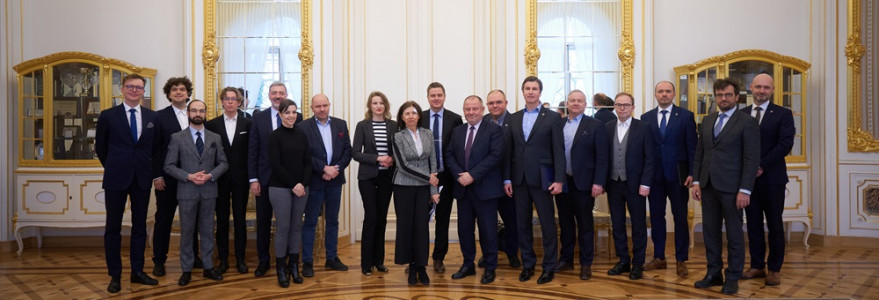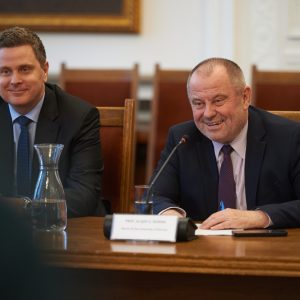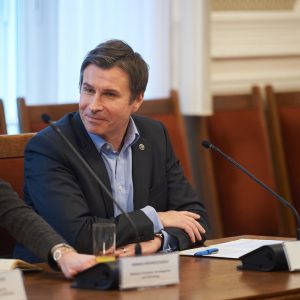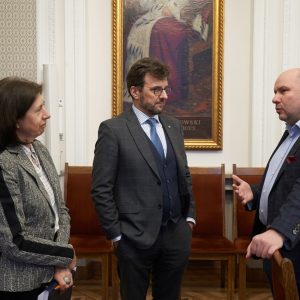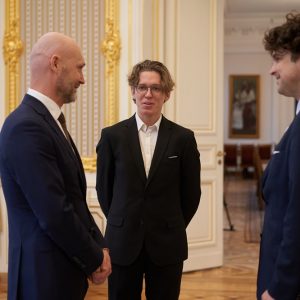Polish students and doctoral candidates are the authors of innovative solutions which will be of use to societies in the future. How can the academic world support them? This was the issue discussed by rectors, representatives of government administration, business as well as students and doctoral candidates during the round table meeting at the University of Warsaw.
The chances of building a strong position for Poland on the market of biotechnology companies were discussed on 4th March by the participants of the round table meeting, which took place in the Senate Hall of Kazimierzowski Palace on the UW campus at Krakowskie Przedmieście.
The views on the challenges and support of the younger generation in creating the solutions of the future were expressed by Prof. Alojzy Z. Nowak, the UW Rector, Dr Thomas Schinecker, CEO of Roche Groupe, Prof. Sambor Grucza, the UW Vice-Rector for Cooperation and Human Resources, Robert Grey, the UW Chancellor, Prof. Jacek Jemielity, the founder of ExploRNA Therapeutics, representatives of government administration, students and doctoral candidates.
We understand that research and education are crucial but an important issue is also cooperation with outside world. As such we regard not only other research institutions, but also representatives of business in broad sense. The University of Warsaw is a comprehensive university, which is based on exact and natural sciences, but also humanities and social sciences. Recently, we have decided to restore medical education at the UW. Sometimes the research has to be done for research itself and the need of broadening the knowledge. On the other hand, we understand that research must also be useful for society. For that reason we do not cease to develop collaboration with business and other universities”, Prof. Alojzy Z. Nowak, the UW Rector, said, adding: “There is an ongoing discussion around the question: what are universities about? Should universities be focused only on research and teaching or should they also be a part of the business world? We are of opinion that both aspects are important for the development of the academic world.
Catalyst for changes
As participants of the debate declared, rectors’ teams can form a platform through which students’ representatives would be able to communicate with entities investing significant resources in R&D projects.
“Strengthening and developing existing cooperation with business, Polish universities have the opportunity to become catalysts for cooperation that our graduates will already be developing on their own with external entities. This will not only be on the employee-employer line, but also within the framework of business partnerships: the originator-implementer of the solution. Roche Polska has been supporting students and doctoral candidates at the University of Warsaw for seven years, e.g. as part of the BioTech Leaders Academy programme that was organised in collaboration with the UW Incubator. The aim of this project is to train future project leaders and scientists involved in biotechnology and biomedical industries. We hope that this cooperation will also be deepened within the activities of the Faculty of Medicine, which began educating future physicians this academic year,” Prof. Alojzy Z. Nowak, the Rector of the University of Warsaw, said.
“It should not be a question of apparent academic cooperation with business, yet it should concern the way it ought to be conducted. When we have a particular idea to implement, we need to be able to present it using the language of business,” added Prof. Sambor Grucza, the UW Vice Rector for Cooperation and Human Resources.
The priority, according to the representatives of the University of Warsaw, is to create an ecosystem that will facilitate the implementation of new biotechnology solutions into the study programme and to smoothen administrative processes.
“It is very important to maintain connections with the outreach and to engage in the cross-sectoral collaboration. That is how we can identify strategic objectives and priorities in line with local, social or industry strategies. Together we can improve the quality of research and face today’s challenges effectively, e.g. in the area of health care,” Robert Grey, the UW Chancellor, remarked.
“Biotechnology is a perfect example of combining excellent science with professional business. Success in biotechnology requires people with much expertise: scientists, lawyers, patent attorneys, people skilful in pharmaceutical regulations etc. To attract these people to Poland, it is necessary to invest in science,” Prof. Jacek Jemielity said.
Business perspective
Biotechnology is an industry where a researcher cannot operate without a business partner, and the latter without the former. This is the approach taken by one of the world’s largest biotechnology companies today: Roche.
At Roche, we are focused on collaboration, driven by the belief that cutting-edge science and technology have the potential to improve health and extend human life. This requires a joint effort focused on bridging the gap between academic knowledge and everyday clinical practice and patient care. By building stable, reliable and long-term partnerships with leading universities and academia, we aim to capitalise on their scientific knowledge and combine it with innovative solutions developed at Roche for the benefit of patients and future leaders of the biotech industry in Poland, Dr Thomas Schinecker, CEO of Roche Groupe, explained.
The event was organised by the Centre for Cooperation and Dialogue of the University of Warsaw on the occasion of the Roche Group CEO, Dr Thomas Schinecker’s visit to Poland. Roche Polska has been supporting students and doctoral candidates at the University of Warsaw for many years, e.g. as part of the BioTech Leaders Academy programme, organised in collaboration with the UW Incubator.



